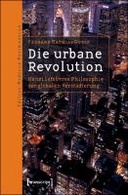Explore

Als 1970 Henri Lefèbvres »La révolution urbaine« (»Die Revolution der Städte«) erscheint, ist die Stadt als komplexes Phänomen vor allem soziologisch untersucht worden. Lefèbvre hingegen definierte die Stadt als »Œuvre« - als Ausdruck menschlicher Kreativität, die im Laufe der Entwicklung an Authentizität verloren hat - und charakterisierte die Verstädterung als dialektisch ablaufenden Prozess mit unbestimmtem Ausgang. Fernand Mathias Guelf zeigt, dass die Verbindung von Revolution und Urbanisierung - als »strategische Hypothese« und Perspektive - für die Hoffnung auf eine neue Qualität des menschlichen Zusammenlebens steht.
This book is included in DOAB.
Why read this book? Have your say.
You must be logged in to comment.
Rights Information
Are you the author or publisher of this work? If so, you can claim it as yours by registering as an Unglue.it rights holder.Downloads
This work has been downloaded 45 times via unglue.it ebook links.
- 45 - pdf (CC BY-ND) at OAPEN Library.
Keywords
- Französische Philosophiegeschichte
- French History of Philosophy
- Globalisierung
- Globalization
- History of Western philosophy
- Humanities
- Kreativität
- Philosophie
- Philosophy
- Praxisphilosophie
- Situationismus
- Social & political philosophy
- Social groups
- Social Philosophy
- social relations
- Society & culture: general
- Society & Social Sciences
- Sozialität
- Sozialphilosophie
- Stadt
- urban communities
- Urban Studies
- Urbanismus
- Urbanity
Links
DOI: 10.14361/transcript.9783839415115Editions

